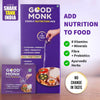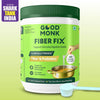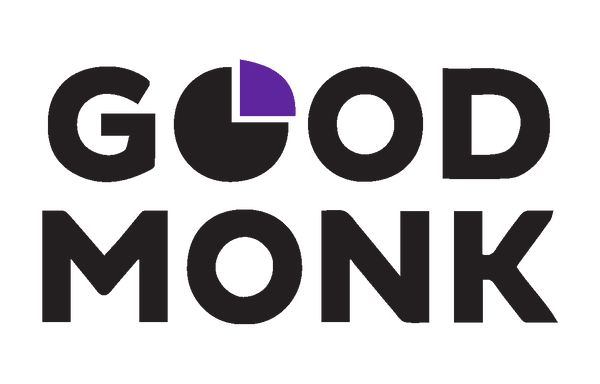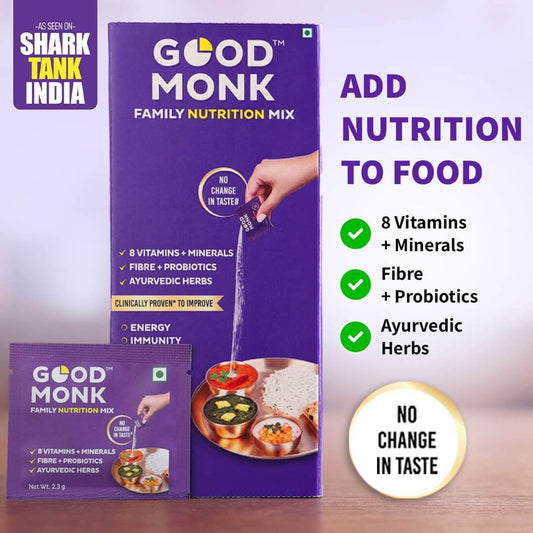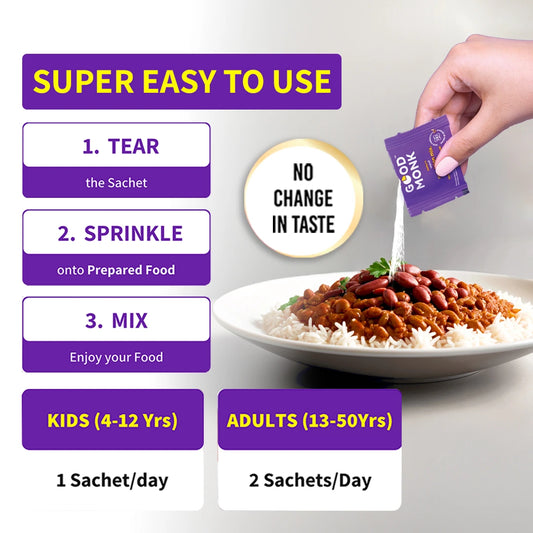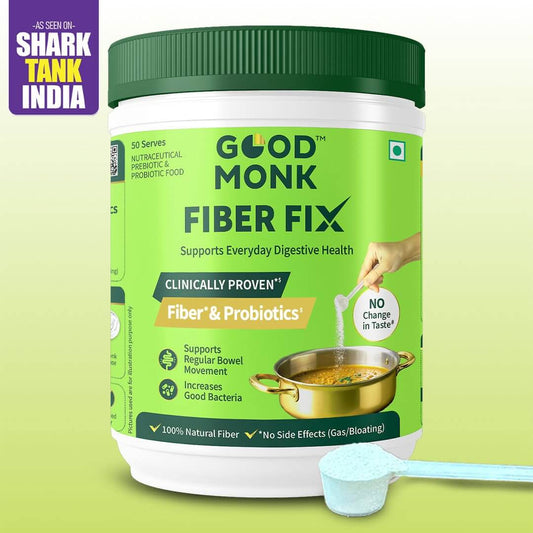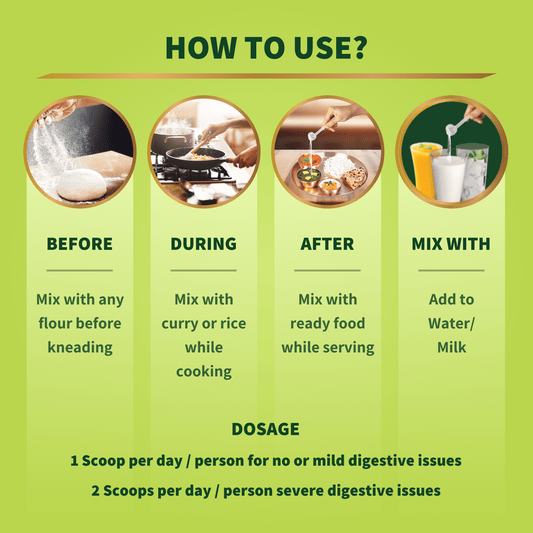Key Takeaways
-
A nutrient-rich brain diet packed with omega-3s, B-vitamins, and vitamin D supports memory, focus, and overall brain health at every age.
-
Starting brain food for memory early, especially in your 40s and 50s, helps slow cognitive decline and promotes healthy ageing.
-
For adults over 50, combining foods to increase brain power with targeted nutrition supplements like Good Monk 50+ Nutrition Mix
In this Article
The Aging Brain - What Happens After 50?
1. Creatine Monohydrate: Brain Food That Powers Memory and Focus
2. Omega-3 Fatty Acids (DHA & EPA): Foods for Memory and Cognitive Health
3. B Vitamins (B6, B9/Folate, B12): Essential Nutrients for Brain and Nerve Health
4. Vitamin D : The Sunshine Nutrient That Protects Cognitive Function
5. Adaptogens and Memory: L-Theanine and Ashwagandha for Brain Function
“7.4% of Indians aged 60 and older are estimated to have dementia.” - Longitudinal Aging Study in India (LASI)(1)
The Aging Brain - What Happens After 50?
As explained in the Book “Geriatric Health” by Hulya Cukmar, as we age, the brain naturally undergoes physical and functional changes:
-
Brain volume shrinks slightly each year starting in midlife.
-
Neurons fire more slowly, affecting processing speed.
-
Oxidative stress and free radical damage accumulate.
-
Blood flow decreases, lowering oxygen and nutrient delivery.
These changes can impact memory, focus, mood, and cognitive flexibility.
Some parts of the brain are affected more than others during aging.
The good news? Nutrition plays a big role in counteracting these changes.
Brain ageing doesn’t suddenly begin at 60. It’s a gradual process that starts as early as your mid-30s and 40s. Studies show that brain volume begins to shrink from midlife onward, and nutrient deficiencies often appear even before noticeable memory or energy changes. That means the right time to support brain health with targeted nutrition isn’t after problems show up, but proactively, ideally in your 40s and 50s. Even if you’re already over 60, introducing the right nutrients with brain foods can improve brain energy metabolism, memory, and overall cognitive function.
Nutrients that fuel cognitive powers!
1. Creatine Monohydrate: Brain Food That Powers Memory and Focus
Is creatine actually good for you?
-
What is it?
Creatine is a naturally occurring compound in the body that combines with phosphate to form phosphocreatine, a quick energy source for cells, especially in muscle and brain tissue.
-
Why is it important for aging?
1. Muscle creatine levels are typically lower in vegetarians and the elderly who may not consume as much meat or seafood in their diet due to difficulty digesting these food products.
2. Research shows creatine supplementation may improve memory, reasoning, and mental fatigue resistance in older adults.
3. Mechanism: supports brain energy metabolism and may protect against age-related neuronal decline. Studies say that older populations that consume creatine daily have better cognitive function than populations that do not (2)
Food sources: Red meat, poultry, fish.
2. Omega-3 Fatty Acids (DHA & EPA): Foods for Memory and Cognitive Health
-
What are they?
Omega-3 fatty acids are essential fats, meaning your body cannot make them on its own. DHA (docosahexaenoic acid) is especially concentrated in the brain, where it helps build cell membranes and supports signalling between neurons.
-
Why does it matter while ageing?
-
Sharper Memory & Cognition
DHA & EPA support brain structure, slow down cognitive decline, and may reduce risk of dementia/Alzheimer’s. -
Better Vision
DHA is a major component of the retina, which helps protect against age-related macular degeneration. -
Lower Inflammation & Slow Biological Aging
Omega-3s reduce “inflammaging” (chronic low-grade inflammation) and may even slow biological aging at the DNA level(3).
-
Where to get it:
Fatty fish (salmon, sardines, mackerel), algae-based supplements (vegetarian/vegan source), walnuts, flax, and chia seeds.
-
Suggested dose:
250–500 mg of combined EPA + DHA per day for general brain health; up to 1–2 g/day in clinical trials on cognitive decline.
3. B Vitamins (B6, B9/Folate, B12): Essential Nutrients for Brain and Nerve Health
-
What are they?
B vitamins are water-soluble nutrients essential for energy metabolism and nervous system function. B6, B9, and B12 are particularly important for homocysteine metabolism.
-
Why it matters for brain health:
Elevated homocysteine levels are linked to brain atrophy and a higher risk of dementia. B vitamins lower homocysteine, protecting neurons and supporting neurotransmitter synthesis (serotonin, dopamine, GABA).
-
Where to get it:
Whole grains, legumes, leafy greens, eggs, dairy, poultry, and fish.
-
Research evidence:
The Oxford VITACOG trial showed that B-vitamin supplementation (B6, folate, and B12) slowed brain atrophy in older adults with mild cognitive impairment(4).
-
Suggested dose:
RDA recommends 1.9 - 3.1 mg of B6, 300mcg of B9, 2.5 mcg of B12.
4. Vitamin D: The Sunshine Nutrient That Protects Cognitive Function

-
What is it?
A fat-soluble vitamin that acts more like a hormone, regulating calcium, immune function, and brain signalling.
-
Why it matters for brain health:
Vitamin D receptors are found throughout the brain. Low vitamin D levels have been linked with depression, slower information processing, and increased dementia risk.
-
Where to get it:
Sunlight (UVB exposure), fortified dairy, eggs, fatty fish, and supplements.
-
Suggested dose:
600 IU/day, depending on blood levels and sun exposure.
5. Adaptogens and Memory: L-Theanine and Ashwagandha for Brain Function
L-Theanine (Green Tea Amino Acid)

-
What it does:
Promotes relaxation without drowsiness, supports alpha brain waves linked with calm focus.
-
Evidence:
Studies show improved attention, stress resilience, and better sleep quality in older adults. A study conducted in Japan suggests that L-theanine may improve working memory and executive function based on the improvement in attention in older adults(5).
-
Why it matters:
Quality sleep and stress management are key to protecting cognition in late life.
-
Recommended dosage:
100-200mg/day
Ashwagandha (Withania somnifera)
-
What it does:
Adaptogen that reduces cortisol, improves stress resilience, and supports memory and executive function.
-
Evidence:
Randomised controlled trials in older adults show improvements in information processing speed, attention, and memory recall.
-
Why it matters in aging:
Chronic stress accelerates cognitive decline; ashwagandha helps buffer stress and preserve brain performance.
-
Recommended dosage:
200-600mg/day
Conclusion
Brain ageing is a natural process, but it doesn’t have to mean inevitable decline. Research shows that nutrition and lifestyle play a powerful role in protecting memory, focus, and overall cognitive performance well into later years.
The key is to start early: nourishing your brain from your 40s and 50s creates a strong foundation for healthy ageing, while continued support in your 60s and beyond can still improve mental sharpness, mood, and resilience. In short, feeding your brain the right nutrients today can help preserve vitality and clarity for the years to come.
References:
1. Lee J, Meijer E, Langa KM, Ganguli M, Varghese M, Banerjee J, et al. Prevalence of dementia in India: National and state estimates from a nationwide study. Alzheimers Dement. 2023 Jul;19(7):2898–912.
2. Candow DG, Ostojic SM, Chilibeck PD, Longobardi I, Gualano B, Tarnopolsky MA, et al. Creatine monohydrate supplementation for older adults and clinical populations. J Int Soc Sports Nutr [Internet]. 2025 Sep 30;22(sup1):2534130. Available from: https://doi.org/10.1080/15502783.2025.2534130
3. Montgomery P, Spreckelsen TF, Burton A, Burton JR, Richardson AJ. Docosahexaenoic acid for reading, working memory and behavior in UK children aged 7-9: A randomized controlled trial for replication (the DOLAB II study). PLoS One [Internet]. 2018;13(2):1–26. Available from: https://doi.org/10.1371/journal.pone.0192909
4. Smith AD, Smith SM, de Jager CA, Whitbread P, Johnston C, Agacinski G, et al. Homocysteine-lowering by B vitamins slows the rate of accelerated brain atrophy in mild cognitive impairment: a randomized controlled trial. PLoS One. 2010 Sep;5(9):e12244.
5. Baba Y, Inagaki S, Nakagawa S, Kaneko T, Kobayashi M, Takihara T. Effects of l-Theanine on Cognitive Function in Middle-Aged and Older Subjects: A Randomized Placebo-Controlled Study. J Med Food [Internet]. 2021;24(4):333–41. Available from: https://doi.org/10.1089/jmf.2020.4803
FAQs on Brain Health and Diet
1. Does memory naturally decline with age?
Yes, memory tends to decline with age, but not everyone experiences it the same way. As you age, your brain undergoes structural changes such as reduced volume, slow neuron firing, and decreased blood flow, which can have an impact on your ability to focus and recall. This is often referred to as mild cognitive impairment in the early stages. However, when you consume the right brain development foods, you endow your diet with the proper nutrients for the brain, such as omega-3 fatty acids, B vitamins, and more, that can help slow down memory loss and support cognitive flexibility while promoting healthy aging.
2. Can I prevent dementia?
Although dementia cannot be completely prevented, research goes on to show that you can significantly reduce the risks through lifestyle choices. A good diet for brain health that is rich in omega-3s, B vitamins and vitamin D can help protect neurons. Furthermore, when you add nutrition supplements to your diet, exercise regularly, sleep well, and manage stress, you get to support your cognitive health. These demential prevention strategies are very successful at taking care of your overall well-being and promoting longevity.
3. What is the best diet for brain health or memory enhancement?
The best diet for brain health includes brain foods for memory like fatty fish, nuts, seeds, whole grains, berries, leafy greens. A thoughtfully chosen brain diet can provide the right nutrients for brain performance, improve cognitive health, and work wonders for memory retention.
4. Does diet impact cognitive decline?
A poor diet can accelerate age-related brain changes, whereas the right foods for memory can slow or even reverse early decline. If you consume a lot of processed sugar and saturated fats, they are going to increase oxidative stress and shrink brain volume. On the other hand, healthy 50 + nutrition mixes from Good Monk, nutrition supplements, and memory foods can lay the foundation for sharper memory and resilience.
5. Do adaptogens improve memory?
Adaptogens like Ashwagandha and L-Theanine can support your brain by lowering your stress hormones and improving focus. Chronic stress can accelerate cognitive decline but adaptogens help restore balance, promote sharper thinking and better recall. When you add adaptogens to your brain diet it can complement the benefits of other memory foods for better impact.
6. Does vitamin D deficiency affect brain function?
Low vitamin D levels are connected to depression, slower processing, and even dementia. Adequate intake from sunlight, supplements fish, eggs and fortified foods, is very important. For those over 50, combining a diet for brain health with targeted nutritional supplements can ensure that your vitamin D levels stay optimal.
7. Which vitamin is best for memory?
B-vitamins like B6, B9, and B12 are very important for memory. They help regulate homocysteine, which is an amino acid linked with brain shrinkage and dementia risk.
Related articles:
About the author:
This blog was written by Nawal Fathima, Innovation and Nutrition Executive at Good Monk - a clean and honest nutrition brand supported by doctors and food scientists. Every product is backed by thorough clinical evidence and clinically proven ingredients and made to help families eat better, feel better, and live healthier every day.
Disclaimer: The content of this blog reflects the author’s summary and interpretation of the topic. It is intended for informational purposes only and should not be considered a substitute for professional advice. The views expressed are not personal opinions but are based on existing research or expert insights, where referenced.
Popular Searches
Milk Mix Powder | Best multivitamin | Multivitamin Powder | Juice Powder | Plant Protein Powder | Weight Management | Health Drink For Senior Citizens | Multivitamin With Probiotic | Fiber Powder | Orange Energy Drink Powder | Immunity Boosting Powder | Weight Management Program
